Arts & Literature _|_ Issue 12, 2019
Robert Lax: A Life Slowly Lived
The contemplative practice of a remarkable 20th-century poet/mystic
by Robert Hirschfield
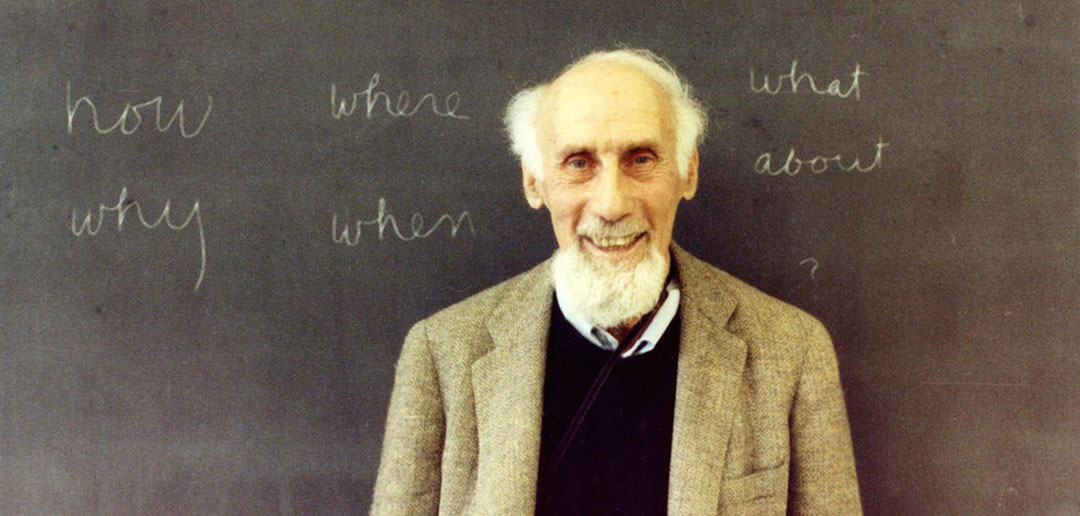
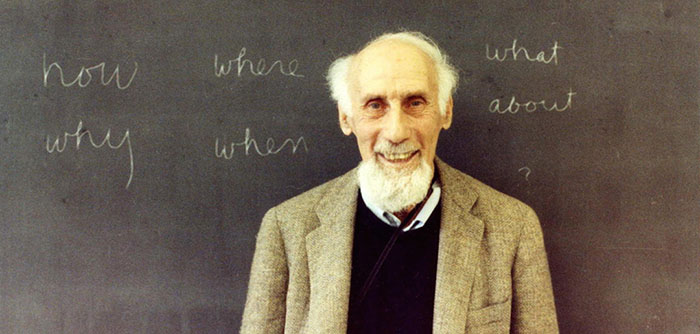
Robert Lax: A Life Slowly Lived
The contemplative practice of a remarkable 20th century poet/mystic — by Robert Hirschfield
Robert Lax was an American writer and poet who developed a unique style of abstract poetry, described by Jack Kerouac as ‘one of the great original voices of our time’. He was also a contemplative who, outside of a formal monastic context, adopted a lifestyle based upon simplicity and prayer which was an inspiration to his many friends and visitors. Thomas Merton, his closest friend, immortalised him in his best-selling book, The Seven Storey Mountain. In the mid-1960s Lax abandoned his career in New York to live on the Greek islands of Kalymnos and Patmos, seeking ‘to put himself in a place where grace could flow’. In this article, Robert Hirschfield presents a central aspect of his spirituality – living slowly.
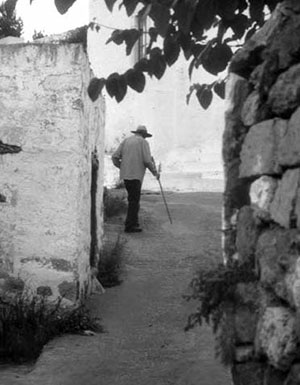 ‘He longs to live married to slowness’
‘He longs to live married to slowness’
This line by the poet Jack Gilbert [1] refers to Dostoyevsky’s contemplative, Alyosha, in The Brothers Karamazov. But it also brings to mind the contemplative abstract poet from Olean, New York, Robert Lax. The poet’s astounding life journey included writing for The New Yorker, working with the poor in Harlem, performing as a clown with the Cristiani Circus in Canada, and even spending time as a scriptwriter in Hollywood. He gave up the noise and the marketplace life of New York City in the early 1960s and journeyed to Greece to pursue a life of poetry and prayer, a life of simplicity. He lived for nearly forty years on the islands of Kalymnos and Patmos before returning home to Olean to die in the millennial year of 2000. He was 84. On his gravestone at nearby St Bonaventure University in Buffalo, in his signature vertical style, is his ruthlessly compressed autobiography:
slow
boat
calm
riv
erqui
et
land
ing
One of the touchstone words in Lax’s spiritual vocabulary was ‘waiting’. By this he meant being still, standing one’s ground, knowing one’s ground, but never quite knowing the reality of what was awaited, longed for. In his volume 33 Poems, recently reissued by New Directions, he puts it this way:
Wake up & wait. Lie down & wait. Sit up again & wait. All in the dark now. No way of telling day from night. Do I expect to hear a voice? See a light? A dim one? A bright one? See a face? I sit up. I’m alert. Do I know what to expect? [2]
‘What you see,’ said Paul Spaeth, keeper of the Lax archive at St Bonaventure, ‘is the opposite of what can be called social action. What you see is a slowing down and waiting on God. Very much in keeping with the monastic tradition. Also very similar to the Buddhist tradition of moment to moment mindfulness.’
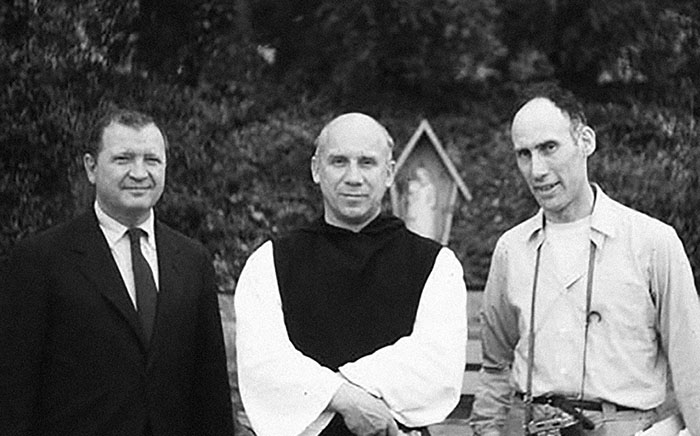
Robert Lax with his two close friends: Thomas Merton (middle) and the abstract painter, Ad Reinhardt (left). Photograph courtesy of the Thomas Merton Center © Bellarmine University
Unlike his friend Thomas Merton, the Trappist poet and author who shared Lax’s interest in Buddhism and brought his name to the world in The Seven Storey Mountain, [3] Lax never lived a life of structured monasticism. A Jewish convert to Catholicism, he built for himself an interior monastery, within which he wrote, prayed, contemplated, and received many visitors: poets, painters, writers (he’d been friends with the legendary abstract artist, Ad Reinhardt, and with Jack Kerouac), and spiritual seekers. ‘Lax can be thought of as a mystic,’ said his biographer Michael N. McGregor, who nevertheless refrained from using that word in his book Pure Act: The Uncommon Life of Robert Lax. [4] He shared his subject’s aversion to the superficiality of labels. He wanted readers to come to their own conclusions about who he was, what he was.’
Steve Georgiou, a seeker from California and author of The Way of the Dreamcatcher, a book of dialogues with Lax, remembers their walks down to Skala, the Patmos harbour. ‘He would walk with a slow roll like the roll of a boat. He would take his meditative steps, encouraging you to slow down yourself and feel the actual experience of walking’. [5]
For Lax, there was no seam between walking, praying, writing. All experiences were to be fully absorbed, integrated into a life fully lived. Once Georgiou saw his friend writing a single word – ‘river’ – over and over. He asked him why. ‘I want to live with the word for a while’, Lax said.
one word at a time.
I believe
I believe
that all people
should stop their fight;
I believe that one should
blow a whistle or
sing or play
on the
lute [6]
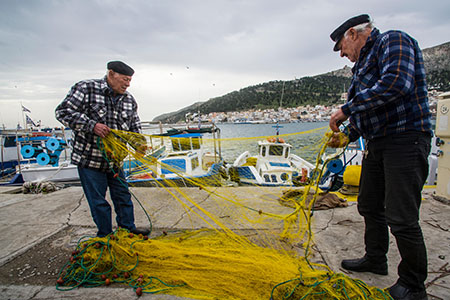
Fishermen on the harbour at Kalymnos, Greece, where Lax was based for many years before moving permanently to Patmos in about 1981. Photograph: Clairy Moustafellou [/] / Alamy Stock Photo
In Search of Pure Act.
Lax wrote: ‘True poetry calls for the refinement of ends and means.’ [7] He first made his name with a collection of poems entitled Circus of the Sun, about his days with the Cristiani Circus family [/]. In their skilfull performances, he found the closest thing he had ever seen to a fully present existence – the ability to be entirely in the moment, to perform a ‘pure act’ [/]. The emergence in mid-life of his New Poems – vertical abstracts with lines often reduced to units of single words, single syllables – mirrored the refinement of a simplified life with its focus on bare units of attention from which nothing was excluded.
the
world
is
il
lu
sion
the
world
is
an
il
lu
sion
the
world
is
my
il
lu
sion
the
world
is
one
of
my
il
lu
sions [8]
His New Poems demanded to be read in a new way. Reading the horizontal line, one is more prone to scan and move on. Dovetailing with the beginning of the computer age, his poems are inadvertently defiant in the way they make readers stop, stay with each word, each syllable. They have to reset old notions as to what words actually are, what syllables are. They can, if they wish, take them apart with the wonder of children taking apart toys and putting them back together again. The re-ordering of the accepted verbal cosmology.
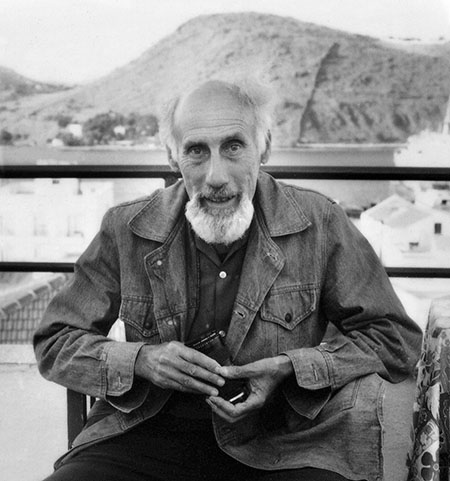
Robert Lax at Patmos harbour. Photograph: Nancy Goldring
For a man who has been called naïve in his assumptions about the day-to-day world, Lax’s words about the value of slowness featured a strong practical side befitting one to whom people came with intractable life problems. ‘He really believed’, maintained McGregor, ‘that if you slowed down and waited, things would reveal themselves to you, you would get put on the right path. He was interested in something that was sure over something that was quick. Most of us want to make a decision and move on. He didn’t think moving on had a great value. He wanted to know what was true and what was right, and that involved slowing down.’ [9] This, from Lax’s Journal C, is a proverb from Kalymnos:
where among kalymnians is the greatest degree
of wisdom to be observed? I think, almost cer-
tainly among the fishermen.
what are the wise things they say and the wise
things they do? Only by living among them,
watching them carefully, listening attentively can
one learn from them gradually.
learn to be a fisherman? learn, slowly, to be wise. [10]
Lax’s niece, Marcia Kelly, tells the story of driving her car in downtown Olean as a teenager and seeing Lax waiting for a bus home. Her initial impulse was to give him a lift, but seeing how absorbed he was, in his one little spot, in everything around him, she just let him be.
The poet was horrified by the noise and speed of motorbikes on Patmos in later years, and would never go anywhere by plane. When he was old and ill and too weak to live on his own, Kelly urged him to come back home with her and her husband. He at first refused, as it would mean having to return by plane. She suggested they go by boat. He accepted. So the old traveller, who lived a life of voluntary poverty, made his final journey on an ocean liner from Southampton.
A time traveller from the time of the Desert Fathers, Lax – known for his inexhaustible sense of humour and pun-making – could poke fun at his tradition and its ideas about time and spiritual permutations over time. Here is his ‘Shorter History of Western Civilisation’:
Egyptians
Babylonians
Persians
Egyptians
Babylonians
Persians
Jews &
Greeks
Jews &
Greeks
Egyptians
Babylonians
Persians
Egyptians
Babylonians
Persians
Jews &
Greeks
Jews &
Greeks
Christians
Christians
Christians
Christians
Christians
Christians
Christians
Christians
Christians
rah
rah
rah [11]
This poem was one of the poet’s rare excursions into social criticism. Estranged from the pace of the world, he was still attuned to the things of the world. He listened on his radio to the BBC. But he digested the news slowly, the way he digested all things. Silence left a lot of space inside him for things to orbit in Laxian leisure and land, as he did, on quiet ground.
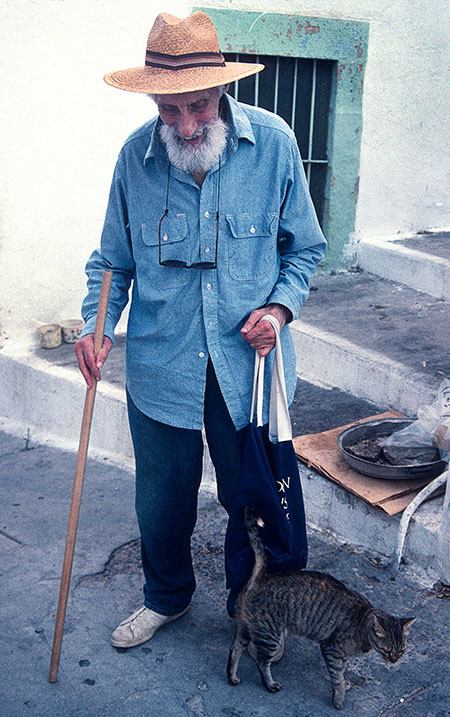
Robert Lax outside his house on Patmos with his beloved cat. Photograph: Nancy Goldring
To explore the life and work of Robert Lax further…
Listen
to him read some of his own poems:
“Something I remember” (2:21 minutes)
“Is was – was is” (2:20 minutes)
“Alley Violinist”, read by Garrison Keillor (0:52 minutes)
Read
- his poem in honour of Thomas Merton: “Harpo’s Progress: Notes toward an Understanding of his Ways”. Click here… [/]
. - his series of late vertical poems Peacemakers Handbooks I–IV and other material on the St Bonaventure archive site. Click here… [/]
Read and Watch
some of his friends’ impressions:
Michael N. McGregor, his biographer, professor of English at Portland State University:
.
- Poetic Man of God (Notre Dame Magazine, Winter 2015–16).
A short article which gives a good potted biography and a lovely sense of the spiritual aspect of Lax’s life. Click here… [/]
. - Harpo and the Clown of God: The Seven-Storied Friendship of Thomas Merton and Robert Lax. Video of a lecture at St Bonaventure University in 2017 (48:30 minutes):
Nancy Goldring, friend, artist and professor at Montclair State University:.
- Putting yourself in a place where grace can flow to you.
A memoir of the time she spent with Lax on Patmos, including typescripts and the recording of a poem on which they collaborated, Legend (1991). Click here… [/]
Steve Georgiou, friend and scholar:
.
- Remembering Robert Lax.
Another memoir from Patmos. Click here… [/]
Image Sources (click to close)
Banner picture: Robert Lax at St Bonaventure University in 1990, when he was invited as the first Reginald A. Lenna Visiting Professor of English to spend three weeks giving readings on campus. He also received an honorary doctorate. Photograph: Paul Spaeth, courtesy of the Robert Lax archive.
First insert picture: Robert Lax on Patmos, starting his walk from the port town of Skala to his house in the hills. Photograph: Steve Georgiou.
Other Sources (click to open)
[1] JACK GILBERT: Alyosha from Collected Poems, Random House, reprinted edition 2014, p. 307.
[2] ROBERT LAX: 33 Poems, New Directions, W.W. Norton, re-issue 2019, p. 18.
[3] THOMAS MERTON: The Seven Storey Mountain, Harcourt Brace 1948, SPCK 2014.
[4] MICHAEL N. McGREGOR: Pure Act: The Uncommon Life of Robert Lax, Fordham University Press 2017.
[5] STEVE GEORGIOU: The Way of the Dreamcatcher: Spirit Lessons with Robert Lax, Templegate Publishing, revised edition 2010.
[6] ROBERT LAX: “In The Beginning Was Love”, from Steve Georgiou: In The Beginning Was Love, Templegate Publishing 2015 / Lax Archives (SBU).
[7] ROBERT LAX and EMIL ANTONUCCI: Circus of the Sun, Journeyman Publishing 1960.
[8] ROBERT LAX: A Thing That Is, Overlook Press 1997, p. 28.
[9] In a personal conversation with the author.
[10] ROBERT LAX: Journal C, Pendo Verlag 1990, reprinted in Love had a Compass, Gove Press 1996, pp. 216–17.
[11] ROBERT LAX: 33 Poems, New Directions, W.W. Norton, re-issue 2019, pp. 65–66.
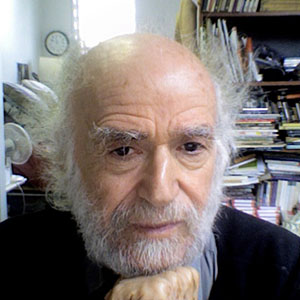
Robert Hirschfield is a New York-based free-lance writer and poet who has published many profiles of contemporary poets as well as stories on nonviolence activists in the Middle East, India, Nepal and the US. His work has appeared in Teachers & Writers Magazine, Tricycle, The Writer, The Jerusalem Report, Sojourners and other Publications
Email this page to a friend
FOLLOW AND LIKE US
——————————————
——————————————
——————————————
FOLLOW AND LIKE US
If you enjoyed reading this article
Please leave a comment below.
Please also consider making a donation to support the work of Beshara Magazine. The magazine relies entirely on voluntary support. Donations received through this website go towards editorial expenses, eg. image rights, travel expenses, and website maintenance and development costs.
READ MORE IN BESHARA MAGAZINE
Bewildered by Love and Longing
Michael Sells and Simone Fattal talk about a new translation of Ibn ‘Arabi’s famous cycle of love poems Translation of Desires
READERS’ COMMENTS

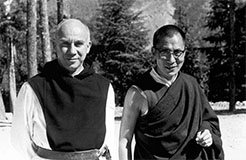
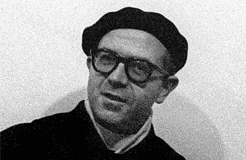
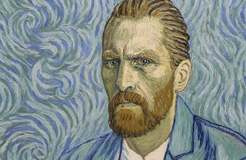
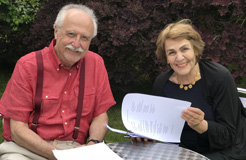
Having just started reading round Thomas Merton and people around him your Facebook page and links are helping me to grow in my spiritual life.
Wherever you are
Is the center
Of the center
Stay the course
Be in the moment
Be where you are
Own the moment
Own the space
Just be
Generally, i appreciate the many Daily Good posts i read, and i liked the story of Robert Lax. As is often the case in such posts, the story is incomplete. How did Mr. Lax come to live on a Greek island and, as we say, put bread on the table? Or, dear readers, how in the world might you accomplish such a feat? Is the task, for most of us to live off the taxes of our neighbors? Such a solution, i submit, is reprehensible. No, my friends, life is complex and often seriously challenging, at least in my experience. And i am older than Mr. Lax was when he died.
Thank you for including this conversation with Steve Georgiou about Robert Lax. Meeting Georgiou was my real introduction to this mysterious and inspiring man – such a compensating light for our time of speed and total immersion in distraction. Taking the time to read the poetry of Robert Lax can be an actual journey to is. Is was. But is can be. Although it rarely is.
The heart needs no introductions. It sinks into the rhythm of a forever soul. It welcomes a new friend like Robert Lax like a long awaited guest that has come home.